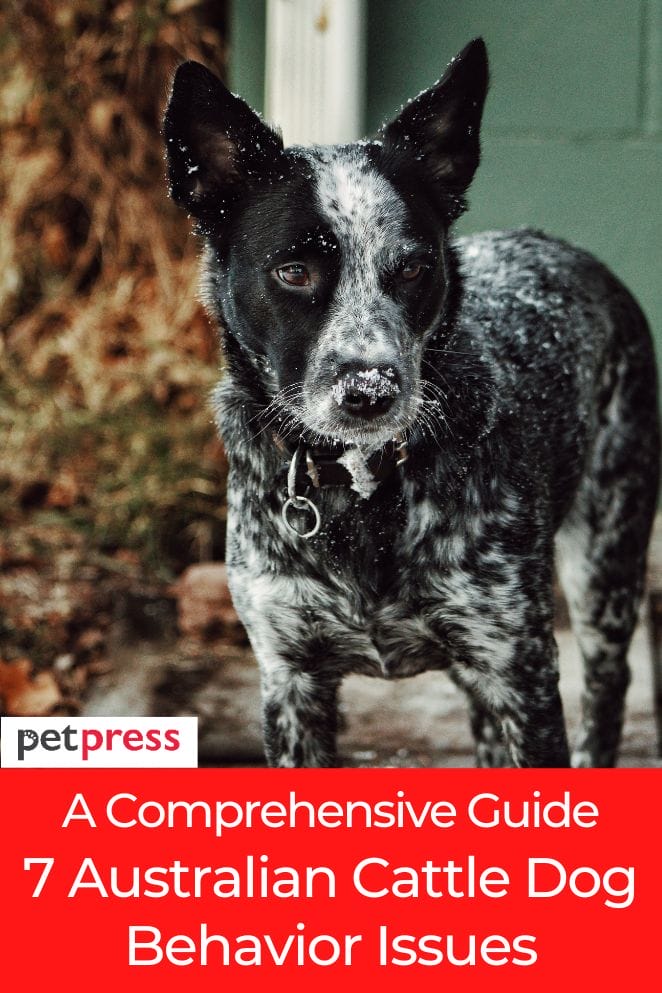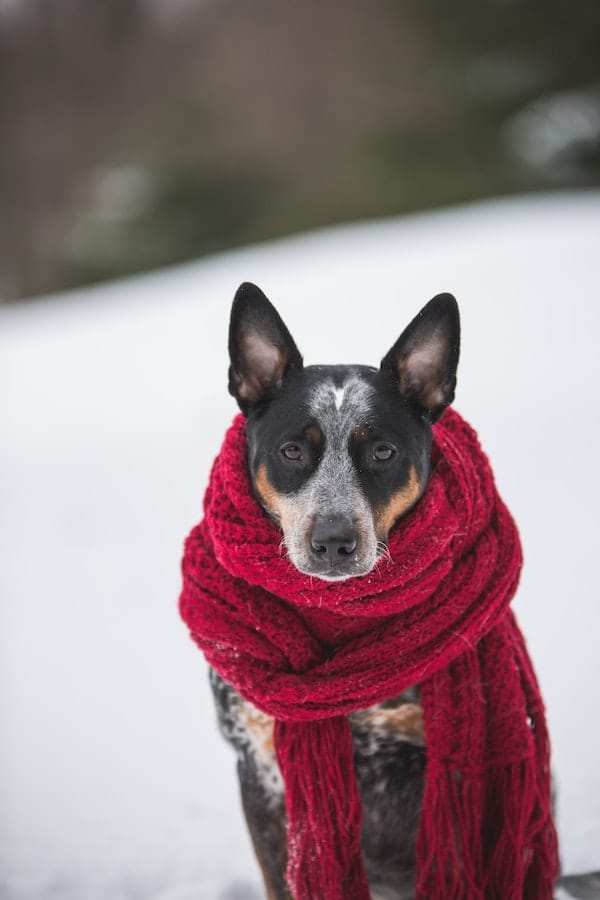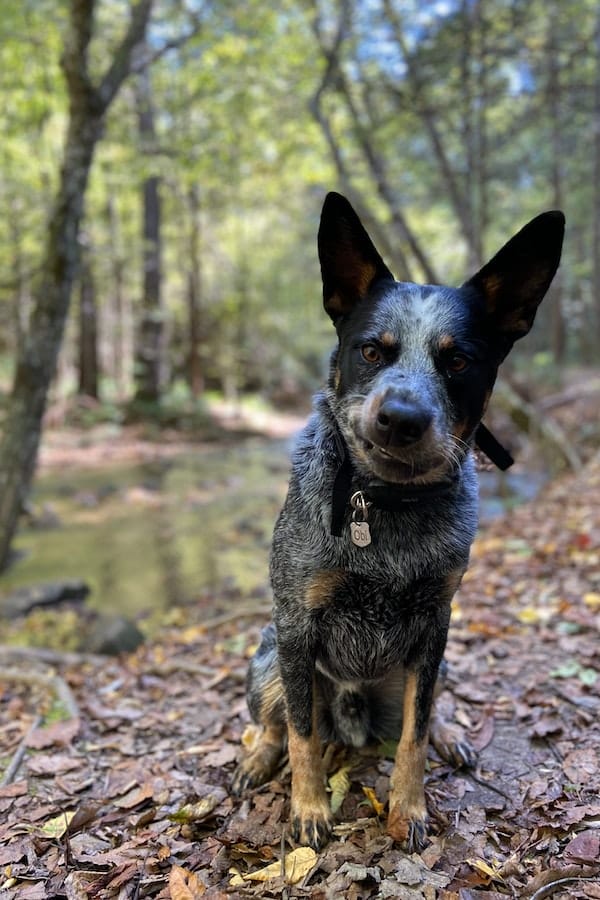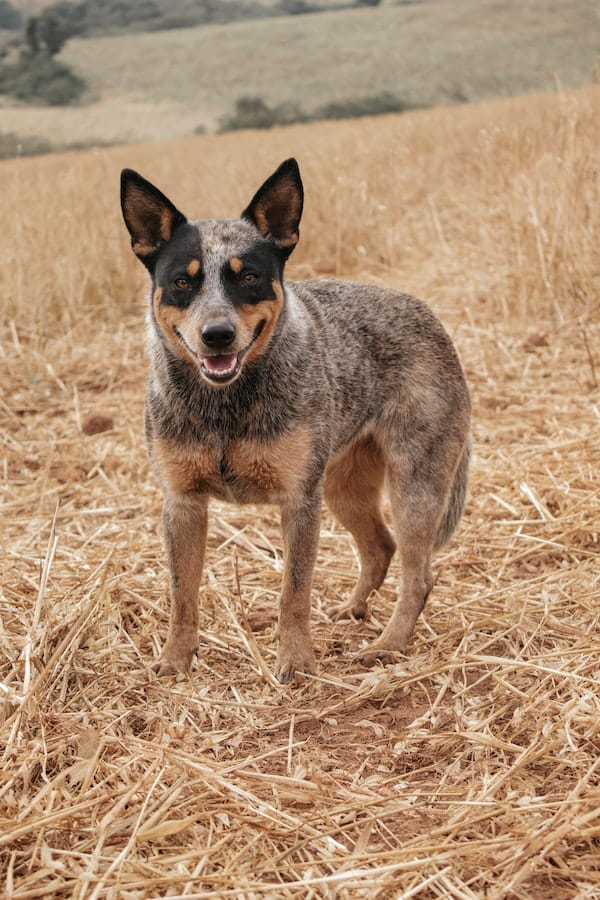
G’day there, fellow dog enthusiasts!
If you’re the proud owner of an Australian Cattle Dog or contemplating bringing one into your life, you’re in for a wild and wonderful ride.
These spirited pups are known for their unique characteristics and boundless energy.
However, like all breeds, they can sometimes exhibit behavior issues that need addressing.
In this article, we’re going to delve into the world of Australian Cattle Dog behavior issues and how to conquer them, ensuring a happy and harmonious life with your furry friend.
Australian Cattle’s Unique Characteristics
Australian Cattle Dogs, often known as Blue Heelers or Queensland Heelers, indeed possess a remarkable set of characteristics that distinguish them from other dog breeds.
Let’s delve deeper into what makes them truly unique.
Distinctive appearance
These dogs are undeniably attractive with their striking blue or red-speckled coats.
This speckling, known as “ticking,” gives them a distinctive appearance that sets them apart in a crowd.
Their perky ears and alert expression add to their charm.
Exceptional intelligence
Australian Cattle Dogs are renowned for their high intelligence.
They’re quick learners and excel in various canine activities such as obedience training, agility, and even herding trials.
Their sharp minds make them highly trainable, and they often thrive on mental challenges.
Unmatched work ethic
Bred for the demanding task of herding cattle in the harsh Australian outback, these dogs are known for their unparalleled work ethic.
Their determination and drive to accomplish tasks are second to none.
They have an instinctual ability to read and control livestock, making them indispensable on farms and ranches.
Endless energy
One of the most striking features of Australian Cattle Dogs is their boundless energy.
They seem to have an endless reserve of stamina, which they put to good use in herding and other physically demanding activities.
This energy makes them ideal companions for active individuals and families who enjoy outdoor adventures.
Loyal and protective
Beyond their working abilities, these dogs are fiercely loyal to their families.
They form deep bonds with their human companions and are often protective, which makes them excellent watchdogs. Their devotion to their owners is unwavering.

Australian Cattle Dog Behavior Issues
While Australian Cattle Dogs are indeed remarkable in many ways, they do come with their fair share of behavior issues that potential owners should be aware of.
Let’s delve into these challenges:
Barking
ACDs are known for their vocal nature.
Their alertness and protective instincts often lead them to bark at the slightest perceived threat or disturbance.
While this can be advantageous in alerting you to potential dangers, it can also be a source of annoyance, especially if they bark excessively or at inappropriate times.
Proper training and socialization can help manage this behavior.
Digging
As you mentioned, ACDs have a natural inclination to dig, which was historically used to find water in the Australian outback.
However, this behavior can become problematic when it carries over into domestic life.
They may dig up gardens, lawns, or even carpets if they are not provided with adequate mental and physical stimulation.
Biting
ACDs have a strong herding instinct, and this can manifest as nipping or biting, especially when they are trying to control the movement of other animals or even people.
This behavior, if not properly managed, can lead to concerns, particularly around children or other pets.
Early socialization and obedience training are crucial in addressing this issue.
Separation anxiety
Separation anxiety can be quite a challenge with Australian Cattle Dogs.
They tend to form strong bonds with their owners, and when left alone for extended periods, they can really struggle.
This often leads to behaviors like excessive barking, destructive chewing, or even attempts to escape.
Aggression toward other dogs
ACDs can be territorial and may exhibit aggression toward other dogs, especially if they haven’t been socialized properly.
This can lead to conflicts at dog parks or when introducing them to new canine companions.
Careful socialization and positive interactions with other dogs are crucial to prevent aggressive tendencies.
Hyperactivity
Hyperactivity is another aspect to watch out for.
These dogs are like bundles of energy, and if they don’t get enough physical and mental stimulation, they can become quite restless.
You might notice them pacing around or even engaging in destructive behaviors as a way to burn off their pent-up energy.
It’s important to keep them active and engaged to avoid this.
Destructive chewing
Like many active breeds, ACDs may engage in destructive chewing if they’re bored or not provided with appropriate outlets for their energy. This behavior can lead to damaged furniture, shoes, and other household items.

Causes of Behavior Issues in Australian Cattle Dogs
let’s dive deeper into the root causes of behavior issues in Australian Cattle Dogs (ACDs).
Understanding these underlying factors can help in addressing and preventing these problems effectively:
Genetics
ACDs have been selectively bred for generations to be high-energy working dogs with a strong herding instinct.
While these traits make them exceptional herders and workers, they can also contribute to certain behavior issues.
Their innate drive to control and manage livestock can lead to behaviors like nipping or herding people and other pets.
Lack of training and exercise
These dogs thrive on physical activity and mental stimulation.
If they don’t receive enough exercise, their excess energy can manifest in destructive behaviors. A bored ACD may resort to chewing, digging, or barking to release pent-up energy.
Lack of socialization
ACDs can be naturally wary of strangers and territorial, which can lead to fear-based aggression if not properly socialized during their early years.
Insufficient exposure to a variety of people, animals, and environments can make them anxious or reactive in unfamiliar situations.
Herding instinct
The herding instinct is deeply ingrained in ACDs. While it’s a valuable trait for working on farms, it can be problematic in a domestic setting, especially with small children or other pets.
Their natural inclination to nip or chase can result in undesirable behaviors.
Environmental factors
The environment in which ACDs are raised and live plays a significant role in their behavior.
Stressful or negative environments, such as prolonged confinement, lack of mental stimulation, or abusive treatment, can lead to behavior problems.
ACDs are sensitive dogs, and harsh treatment or neglect can have adverse effects on their behavior.
Medical issues
Sometimes, underlying medical issues can contribute to behavior problems.
Pain or discomfort from conditions like arthritis or dental problems can cause a dog to act out in unexpected ways.

How to Prevent Behavior Issues
Preventing behavior issues in Australian Cattle Dogs requires proactive measures and consistent training.
Here are some tips to help you maintain a well-behaved canine companion:
Regular exercise
ACDs have high energy levels and require ample physical activity.
Daily exercise, such as long walks, runs, or agility training, is essential to help them burn off excess energy.
A tired dog is less likely to engage in destructive behaviors.
Mental stimulation
These dogs are not just physically active but also highly intelligent.
Puzzle toys, interactive games, and obedience training can provide mental stimulation, preventing boredom-related issues.
Engaging their minds is as important as exercising their bodies.
Early socialization
Start socializing your ACD from a young age.
Expose them to various people, animals, and environments to build their confidence and reduce fear-based aggression.
Proper socialization helps them become well-adjusted and comfortable in different situations.
Positive reinforcement
Use positive reinforcement techniques consistently.
Reward your dog with treats, praise, and affection when they exhibit desired behaviors.
This approach reinforces good conduct and encourages them to repeat it. Avoid punitive training methods, as they can lead to fear and anxiety.
Consistent training
Enroll in obedience classes or work with a professional dog trainer who understands the breed’s unique characteristics.
Consistent training routines help establish clear boundaries and reinforce commands.
Regular practice and repetition are key to instilling good behavior habits.
Be patient
Behavior modification takes time, especially if you’re dealing with existing issues.
Be patient and persistent in your training efforts.
ACDs are intelligent and can learn, but they may require more time and repetition than some other breeds.
Environmental enrichment
Create a stimulating environment for your ACD.
Provide them with toys, puzzles, and activities that challenge their problem-solving abilities. Rotate toys to keep things interesting and prevent boredom.
Supervision
Keep a watchful eye on your ACD, especially when they are in new or potentially problematic situations.
Early intervention can prevent unwanted behaviors from becoming habits.
Consistent routine
Dogs thrive on routine. Establish a consistent daily schedule for feeding, exercise, and rest. Predictable routines can help reduce anxiety and behavioral issues.
Seek professional help
If you’re struggling to manage behavior problems or if they persist despite your efforts, don’t hesitate to seek the guidance of a professional dog behaviorist or trainer.
They can provide tailored advice and strategies to address specific issues.
Conclusion
Australian Cattle Dogs are truly amazing companions, but their unique characteristics can sometimes present challenges.
However, with a deep understanding of the underlying causes of behavior issues and a proactive approach to prevention, you can forge a loving and harmonious connection with your furry friend.
Now that you have this knowledge about Australian Cattle Dog behavior, go ahead and nurture a strong and loving bond with your spirited companion.
Always remember that a well-trained and contented pup is a delightful addition to any family. Here’s to happy and fulfilling dog parenting!
FAQs
Yes, with proper socialization and training, Australian Cattle Dogs can be great family pets. However, they may have a strong herding instinct, so supervision is essential.
These dogs require at least an hour of vigorous exercise daily to keep them happy and healthy.
Yes, with patience, consistent training, and positive reinforcement, many behavior issues in Australian Cattle Dogs can be resolved or managed effectively.


GIPHY App Key not set. Please check settings